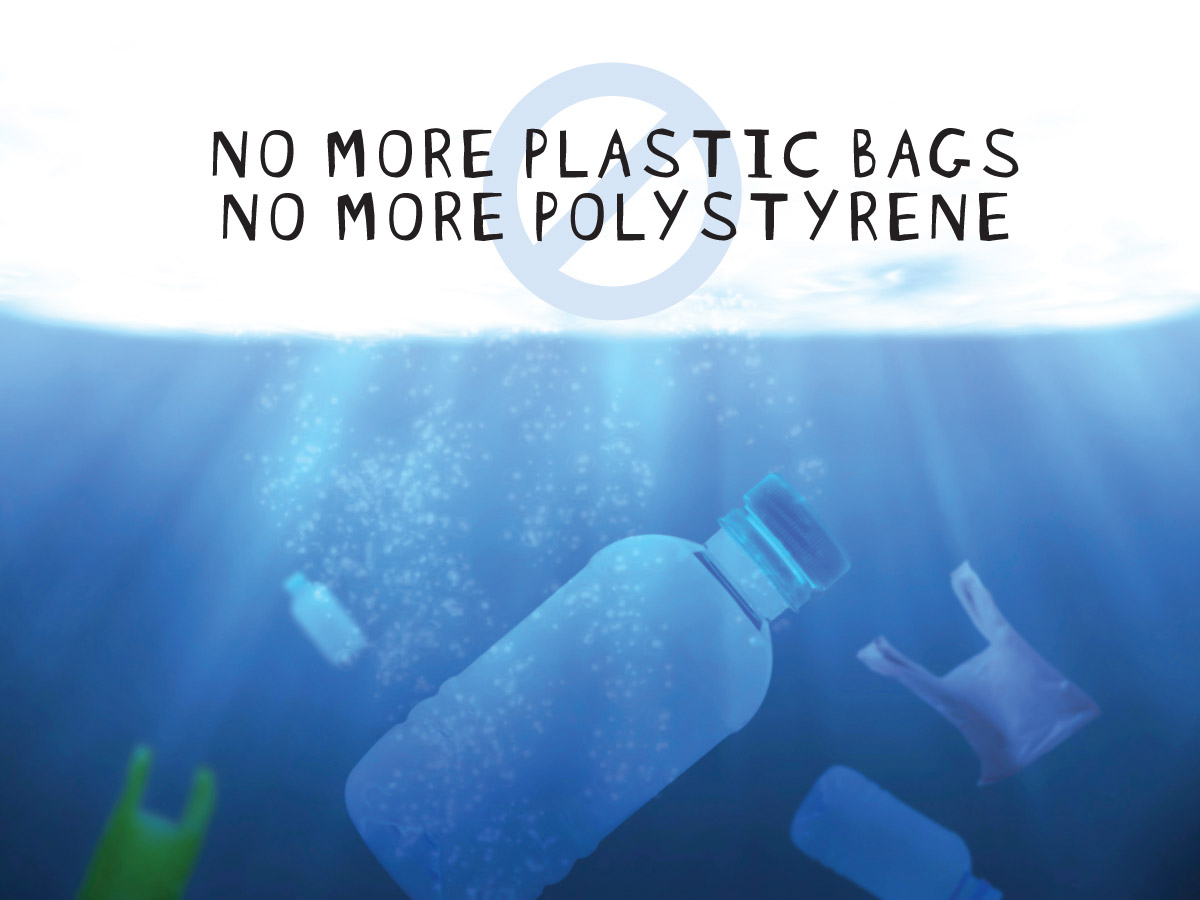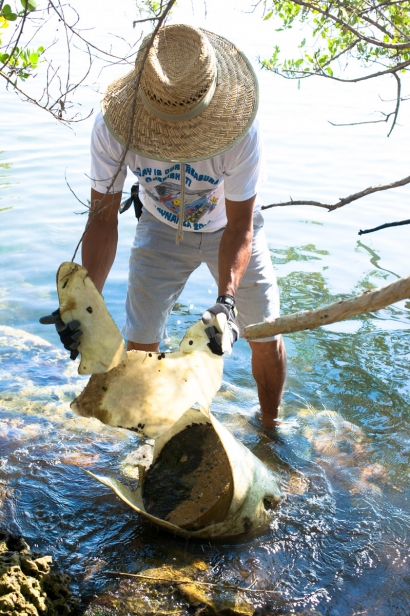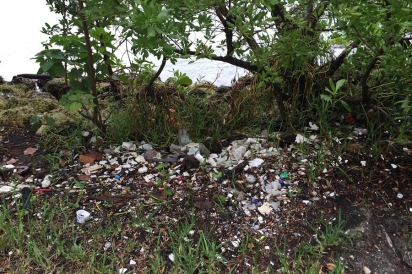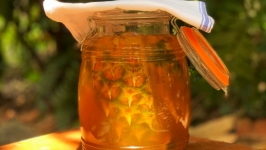No More Plastic Bags. No More Polystyrene.
Restaurants scoop leftovers and take-out into compostable clamshell boxes and neatly wrap them up to-go in a biodegradable bag. Grocers pack weekly hauls into reusable sacks instead of dozens of plastic bags. Cafes pour smoothies into sustainable, corn-based resin cups. Park visitors refill their water containers for free instead of buying bottled water. No more Styrofoam coolers at beaches, either. This is the new way of life in South Florida as cities lead the way in the movement to keep plastics out of the landfills, oceans and waterways.
Summer is bringing changes to how we live in South Florida. Effective July 1, polystyrene products – coolers, to-go containers, tableware, plates, cups and lids – are banned in Miami-Dade parks and beaches. In May, Coral Gables became the first city in Florida to ban retailers from using plastic bags. Coral Gables Commissioner Vince Lago, who introduced this ordinance, sees this as an important step in leading the state towards better championing environmental causes. “I think that we can make changes at a local level which are so impactful that can eventually result in a domino effect and reverberate throughout the state and truly set an example for not only state, but federal officials to follow,” he says.
“When I got elected to the City of Coral Gables, we did a really simple assessment of where the city was in regards to our sustainability platform and proposed endeavors. It was nonexistent. We were not even recycling in city offices,” says Lago. The plastic bag ban, which goes into effect after a year-long educational campaign during which retailers can use up their existing stock and adopt alternatives, is part of Lago’s comprehensive sustainability platform.
Coral Gables also began fully enforcing a previously passed polystyrene, or Styrofoam, ban on Jan. 1. The Styrofoam legislation had been met with a lawsuit from the Florida Retail Federation (FRF), representing Publix Super Markets and 7-Eleven, among others. Florida state law preempts local governments from regulating the use or sale of polystyrene products, but in municipalities like Miami Beach, which had passed bans prior to Jan. 1, 2016, the legislation was upheld.
The FRF claimed that Coral Gables illegally backdated the passage of their ban. Miami-Dade Circuit Judge Jorge Cueto ruled in favor of Coral Gables and upheld the Styrofoam ban, paving the way in his decision for the plastic bag ban. But other cities that did not have any sort of Styrofoam restrictions on the books before 2016 no longer have the freedom to keep Styrofoam out of their community.
Styrofoam-free Parks
Such is the case for the City of Miami. But Miami Commissioner Ken Russell is persisting in finding ways to keep Styrofoam pollution out of the fragile ecosystems in his district. “I believe it probably surprised the other commissioners that we were bringing it up. Because the assumption is that we can’t do anything about it,” says Russell. “But you think where your jurisdiction is, what you can manage, what you have authority over and you implement there. So that’s where we came up with the idea of removing it from parks.”
The state preemption still allows local governments to restrict polystyrene on public property and for temporary vendors on public property. The City of Miami and Miami-Dade County have taken advantage of this provision and approved ordinances to block Styrofoam products from being brought into their respective parks and beaches.
The goal of this legislation is primarily about education, and increasing the awareness of the harmful impacts of Styrofoam particulates on the coastal ecosystems. “If we see somebody with Styrofoam in the park, they’re not going to get tackled,” says Russell. “It’s about education and influence is a positive direction, and creating habits among people – it’s meant to be a positive journey.”
A provision in the City of Miami’s legislation even creates an education center at the historic Virginia Key Beach about pollution and environmental degradation. Coral Gables also focused on education during the year-long grace period for polystyrene. “If they have a little bit of extra stock, it took a year and two months, we weren't there hitting you with a fine,” says Lago, “But it was interesting to see that as the year came to an end and the fines commenced, people had already fallen into compliance.”
Ban on the Beach
Miami Beach was the first city to pass a comprehensive Styrofoam ban back in 2014. As of September, the city had issued 91 notices of violations and only 20 written warnings, which according to Yanira Pineda, a sustainability specialist at the City of Miami Beach, have consistently decreased since enforcement began. “As part of a goodwill effort, the city established a ‘cooler swap’ in 2012 in which code or police officers switch Styrofoam coolers that beachgoers have with reusable coolers,” says Pineda, “Since the start of the ban, we have seen a significant decrease in the amount of Styrofoam coolers on the beach.”
Environmental activism groups, including Surfrider and the Everglades Foundation, have been pushing for this type of legislation to be passed in South Florida due to the immense damage plastic bags and polystyrene cause to the coasts. Grassroots citizen activism contributed to the success of these proposals, even in the face of the state preemption and powerful special interest groups like FRF.
Lago believes local governments in South Florida can do a lot to push environmental advocacy forward. “I learned that a small city like Coral Gables with a few committed public servants can make a significant difference,” he says. “And that we should do everything in our power to set an example for future generations and never succumb to the pressures of special interests.”
12 WAYS TO REDUCE YOUR PLASTIC USE
1. Support local businesses that use sustainable materials.
2. Encourage your favorite businesses to switch to sustainable materials.
3. Keep reusable bags in your car.
4. Keep a single plastic bag folded in your wallet for reuse when a plastic bag is needed.
5. Don’t use straws or lids with fountain drinks. Just drink normally.
6. Buy soda in fully recyclable aluminum cans instead of plastic bottles. Look for beverages in glass bottles.
7. Buy fruits and vegetables and food that isn’t packaged.
8. Buy in bulk to reduce packaging. Bring jars and your own containers.
9. Buy in stores instead of online to reduce packaging.
10. Carry a refillable water bottle whenever you go out.
11. Bring your own thermos to the coffee shop.
12. Buy milk in cartons.












